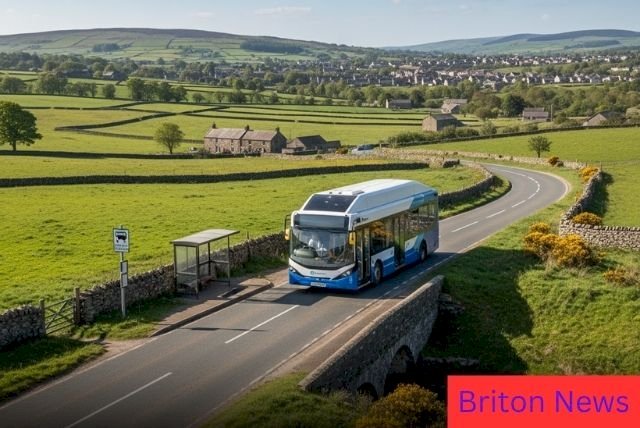Cumberland Council Launches Government-Backed Rural Bus Reform Pilot to Improve Transport and Accessibility
Cumberland Council launches a DfT-backed rural bus reform pilot to improve public transport, accessibility, and sustainability across Cumbria.

Cumberland Council has officially launched a government-backed rural bus reform pilot aimed at improving transport accessibility and reliability across some of Cumbria’s most remote communities.
The initiative, developed in partnership with Westmorland and Furness Council and supported by the Department for Transport (DfT), forms part of the national Bus Back Better plan. This government strategy seeks to revitalise local bus services across the UK, particularly in rural and semi-rural areas where residents often face infrequent and unreliable public transport.
Government Support and Strategic Vision
The pilot, funded through the Rural Mobility Fund, positions Cumberland as a leader in rural public transport reform. It focuses on testing new operating models, including bus franchising, which gives councils greater control over routes, fares, and service standards.
“This pilot represents a major step forward for our rural communities,” said Cllr Denise Rollo, Cumberland Council’s Executive Member for Sustainable Transport. “We are committed to creating a reliable, affordable, and accessible network that connects people to jobs, healthcare, and education. This project is about fairness and opportunity.”
The DfT-backed pilot aligns with the UK’s wider goals of modernising transport infrastructure while supporting regional growth and sustainability.
Simon Lightwood, Minister for Roads and Local Transport, said: “Cumberland’s bus reform pilot shows how local innovation can transform national outcomes. We’re backing this initiative because it reflects our shared commitment to rebuilding trust in local bus services and ensuring that rural residents have the same access as those in cities.”
Goals and Motivation
Cumberland is one of the UK’s most geographically challenging regions for public transport. With dispersed populations and large rural distances between towns, car dependency has become the norm. This has left many elderly residents, students, and low-income households isolated from key services and employment opportunities.
The Cumberland bus pilot aims to reverse this trend by improving frequency, reliability, and connectivity. The plan includes better access to education, healthcare, and workplaces, while also providing affordable travel options for those without cars.
“Public transport in rural Cumbria has often been inconsistent, and that has impacted livelihoods,” said Mark Reynolds, a local transport analyst. “This pilot recognises that accessibility isn’t a luxury — it’s essential to economic and social wellbeing.”
Funding, Duration, and Scope
Backed by government funding through the Rural Mobility Fund, the pilot will run through at least 2026 and will test new approaches to bus franchising and network integration.
Cumberland Council is working closely with Westmorland and Furness Council to ensure that routes align with regional transport systems. This integration will improve coordination between buses and other modes of transport, such as rail and community shuttle services.
The project’s first evaluation period is expected in late 2026, with an initial rollout of expanded routes beginning in early 2026.
Planned Changes and Innovations
The bus reform pilot introduces a mix of reinstated and new routes across key corridors linking towns and villages.
Notable planned routes include:
-
Carlisle to Cockermouth, reinstating evening and weekend services.
-
Whitehaven to Ravenglass, extending connectivity along the coast.
-
Workington town loops, offering new connections to surrounding villages.
Other innovations include:
-
Increased bus frequency on busy commuter routes.
-
Contactless and mobile ticketing for faster boarding.
-
Real-time bus tracking available via mobile apps and bus stop screens.
-
Flexible “on-demand” minibus services for rural hamlets with low population density.
“Our focus is on smarter scheduling, integrated routes, and convenience,” said Cllr Rollo. “We want to create a system that works for every resident, not just those in large towns.”
Community Impact
The pilot has received widespread support from residents, businesses, and community groups who say it could help address years of underinvestment in rural mobility.
“Reliable buses will help businesses attract staff and customers,” said Lisa Thompson, a café owner in Workington. “This initiative could give small towns a real boost, especially for workers who don’t drive.”
Residents across Whitehaven, Workington, and Egremont have echoed similar views, pointing out that the lack of evening buses often limits access to social and community activities.
“For many elderly residents and students, a single extra bus can make all the difference,” said Tom Richards, a local youth worker. “It’s more than transport — it’s independence.”
Environmental and Social Goals
The Cumberland Council bus pilot supports Cumbria’s commitment to net-zero carbon targets. Plans include introducing low-emission and electric buses, particularly on busy routes between Carlisle and West Cumbria.
By encouraging a shift from private cars to public transport, the initiative aims to cut emissions, ease congestion, and reduce the environmental footprint of rural travel.
A council spokesperson said: “Every person who chooses the bus over a car helps us move closer to our sustainability goals. Cleaner, modern vehicles and reliable timetables will help create greener, healthier communities.”
Socially, the project promotes inclusion by reconnecting isolated villages and ensuring that vulnerable groups have equal access to transport.
Challenges and Next Steps
Despite optimism, officials acknowledge several challenges ahead.
Key concerns include ensuring long-term funding sustainability, recruiting drivers, and maintaining service consistency beyond the pilot phase.
Public consultations are ongoing, allowing residents to share feedback on proposed routes and timetables. The first new services are expected to begin operating in early 2026, followed by a review and expansion phase later in the year.
“This pilot must be built with residents, not just for them,” said Cllr Rollo. “Public feedback will guide every stage of our decision-making process.”
Community Participation
Residents are encouraged to participate in shaping the pilot’s outcomes by sharing feedback through the Cumberland Council website, attending local transport meetings, and completing online travel surveys.
Feedback will help identify priority routes, accessibility needs, and scheduling improvements before the full rollout.
For more details, visit www.cumberland.gov.uk
Broader Significance
Experts believe the Cumberland bus reform pilot could serve as a national model for rural transport reform. Its results will inform future UK public bus policy and help refine how councils implement bus franchising in rural areas.
If successful, the approach may be replicated in other counties facing similar challenges, proving that rural communities can enjoy transport systems that are modern, efficient, and sustainable.
“This is more than a pilot,” said Minister Lightwood. “It’s a test of how local leadership and national support can work together to deliver change that lasts.”
The initiative underscores a growing effort across the UK to balance economic, environmental, and social priorities in transport planning — and Cumberland is leading the way.
About Briton News
Briton News continues to report on regional innovation and public service reform across the UK. Our coverage of the Cumberland bus reform pilot reflects our commitment to highlighting how local initiatives drive national progress.
Stay connected with Briton News for updates on government transport initiatives in Cumbria and the future of rural bus reform in the UK.
FAQs
1. What is the Cumberland bus reform pilot?
The Cumberland bus reform pilot is a government-backed public transport initiative launched by Cumberland Council to improve rural bus services across Cumbria. It aims to make local travel more frequent, reliable, and accessible by testing new service models such as bus franchising.
2. Who is supporting the Cumberland bus pilot?
The pilot is supported by the Department for Transport (DfT) under the UK’s Bus Back Better plan. It is also being delivered in partnership with Westmorland and Furness Council to strengthen regional transport links and coordination.
3. What are the main goals of the bus reform pilot in Cumbria?
The main goals are to increase bus frequency, reduce rural isolation, and improve accessibility for residents in remote areas. The pilot also supports net-zero carbon targets by encouraging public transport use over private cars.
4. Which towns and routes will benefit from the pilot?
Key routes include new and reinstated services connecting Carlisle, Whitehaven, Workington, Cockermouth, and Ravenglass. The pilot will also test on-demand services for smaller villages with limited transport access.
5. How is the Cumberland bus pilot funded?
The project is funded through the UK government’s Rural Mobility Fund, which supports innovative transport solutions in rural areas. The funding covers operational costs, new routes, digital technology, and low-emission vehicles.
6. What new features are being introduced under the reform?
Cumberland Council plans to roll out contactless ticketing, real-time bus tracking, and digital route information for passengers. There will also be improved timetables, on-demand buses, and low-emission vehicles as part of the pilot.
7. How long will the Cumberland bus reform pilot run?
The pilot will run through at least 2026, with the first phase of new routes and service improvements launching in early 2026. A full evaluation will take place later that year to assess its impact and potential for wider rollout.
8. How can residents provide feedback or get involved?
Residents can share their views through the Cumberland Council website, attend local transport meetings, or complete online surveys. Public feedback will help shape routes, schedules, and future improvements during the pilot phase.
9. What challenges does the bus reform pilot face?
Challenges include funding sustainability, recruiting drivers, and ensuring long-term service viability beyond the pilot period. The council is addressing these issues through community consultation and close collaboration with local operators.
10. Why is the Cumberland bus reform pilot important for rural transport in the UK?
This pilot is a pioneering government transport initiative that could serve as a national model for improving rural mobility. Its success may influence future UK bus franchising policies and help other councils modernise public transport in remote areas.
11. How does the Cumberland bus reform pilot support environmental goals?
The pilot promotes sustainable, low-emission public transport and aims to reduce car dependency. By introducing electric buses and increasing passenger use, Cumberland Council hopes to cut emissions and support Cumbria’s net-zero climate commitments.

















